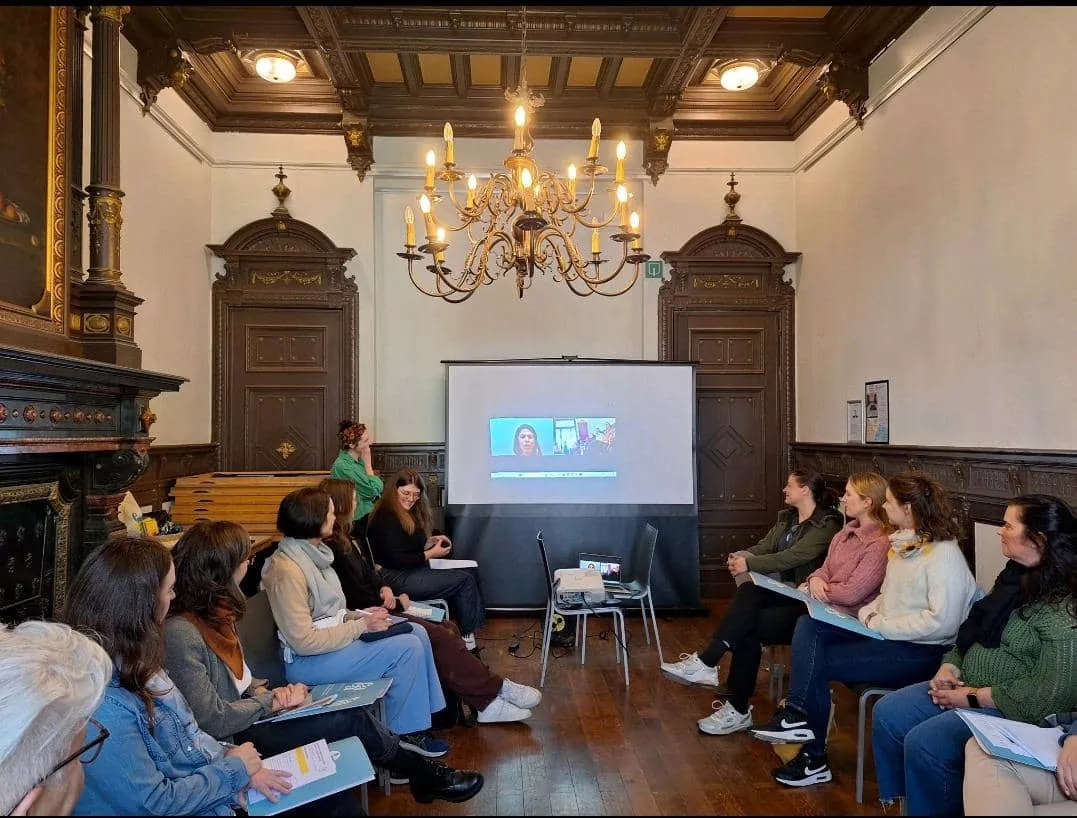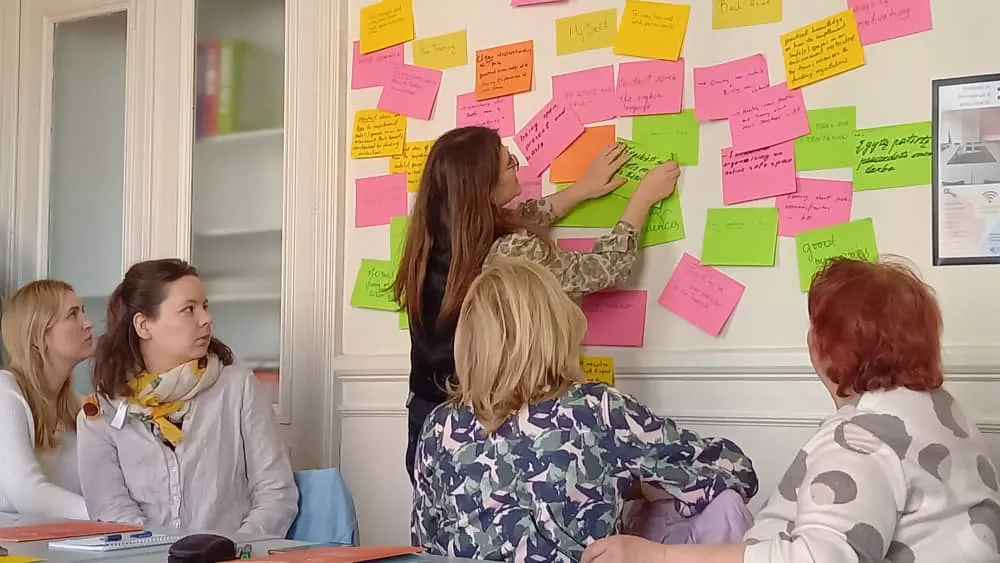Professionalisation of adult educators: A pathway to achieving excellence in Adult Learning and Education.

In today's fast-paced world, education has grown beyond early years of learning and learning within the four walls of the classroom to a lifelong learning experience, with adults recognising the relevance of constantly learning and improving to remain competitive in the workplace and traverse the complexities of modern life. The need to equip adults with skills for the labour market and most importantly with life skills such that promotes active citizenship, sustainability, digitalisation, social cohesion, health and wellbeing etc. in order to live healthier, happier and function properly in the society has increased the demand for Adult learning and education. Adult learning and education (ALE) is an essential part of lifelong learning and involves all types of learning and training that ensure the full participation of adults not just in labour markets but in sustainable development, equality, active citizenship etc. This is also in line with SDG4 target 4.7, which aims to ensure all learners acquire the knowledge and skills needed to promote sustainable development through education for sustainable development and sustainable lifestyles, human rights, gender equality, promotion of a culture of peace and non-violence, global citizenship and appreciation of cultural diversity and of culture’s contribution to sustainable development by 2030.
UNESCO (2015) defines ALE as the entire body of learning processes, which could be formal, non-formal and informal, that enables those referred to as adults in the society to develop and enrich their capabilities for living and working for their benefit, the benefit of their communities, organisations and societies. Additionally, UNESCO (2022) identified three critical fields in ALE; literacy and basic skills, continuing education and vocational skills, and liberal, popular and community education and citizenship skills.
Additionally, EAEA (2019) views ALE as a human right and common good and a tool to change lives and transform societies. In fact
ALE encompasses all lifelong learning activities or forms of education which equips adults to tackle challenges faced in the society such as inequality, violence, unemployment, health issues, environmental issues, issues affecting democracy and to live and thrive in the society. ALE caters to a wide range of learners, from those looking to increase their career prospects to those seeking to learn for fun to those seeking to further their education, etc.
Teaching these essential skills and competencies required by adults to tackle these challenges and thrive in society requires the help of adult educators who are knowledgeable and possess the necessary interpersonal, motivational and professional skills and expertise to train and support adult learners successfully. These educators who carry out this responsibility of teaching, working with, helping, motivating and supporting adults to improve their lives and societies should also be recognised, encouraged and supported through professionalisation and professional development.
Benefits of Professionalisation of Adult Educators
Firstly, the professionalisation of ALE educators is crucial to promoting the quality and effectiveness of ALE. The professionalisation of ALE is not merely a trend; it is the pathway to achieving excellence for adult educators and learners. Excellence in this article refers to achieving quality in the processes and outcomes of ALE. It encompasses tailoring lessons to individual needs, use of innovative teaching methodologies, providing inclusive and supportive learning environments for all adult learners among others. It is imminent that adult educators are competent in their skills and stay updated on effective ways to educate adults to be informed on topics relating to democracy, active citizenship, health, equity etc, to have increased learning outcomes and that skilling and reskilling, which are necessary to meet the evolving needs of society and the world of work, are upheld in ALE. This is in line with UNESCO (2015) recommendation, which highlighted that the professionalisation of adult educators, improving training, capacity building and employment conditions of adult educators is crucial for achieving quality ALE.
Adult learners come from diverse backgrounds and have unique learning needs and styles. Therefore, professional adult educators equipped with specialised knowledge and skills supported through continuous professional development are crucial in catering to the diversity of learners and ensuring quality and effective teaching and learning.
Secondly, professionalisation of adult educators promotes a culture of excellence and continuous improvement in the field of ALE. It ensures that these adult educators undergo training, become certified, undergo continuous professional development and are up-to-date with emerging trends and promising practices in ALE, which they can adapt to support diverse learners and effectively deliver effective teaching in ALE. According to the stem project report, professional development is crucial in improving the effectiveness and efficiency of the educational environment, methods, learning content and outcomes. Also, achieving better knowledge and skills among adult learners depends on the involvement of well-trained and prepared adult educators.
Finally, the professionalisation of adult educators can help improve the status of ALE. Adult learning and education and its relevance are often undervalued and ignored compared to other education sectors. For instance, according to 2023 country reports by EAEA, lack of recognition and validation of ALE and its value is one of the significant challenges of ALE in many EU countries including in Armenia, Austria, Bulgaria, Croatia etc. This lack of recognition, which is associated with the vast funding challenge experienced in this sector, can be linked to the feeling of frustration among adult learners and educators, which can negatively impact their effectiveness in the classroom. Also, DVV (2019) stated that many non-formal adult educators who work in diverse, sustainable livelihood projects in South Africa are often excluded from the state national skills’ development programmes due to lack of professionalisation. Ensuring the professionalisation of adult educators will bring about recognition and can also improve the status of ALE.

Enhancing the Professionalisation of Adult Educators
The professionalisation of adult educators remains an imperative issue in ALE. It involves ensuring that those who teach in ALE receive specialised pre-service, in-service and continuous professional development. It also entails that adult educators have qualifications and certifications and uphold standards that demonstrate their expertise, just like in other education sectors; however, this is not usually the case. For instance, Marceau (2003) reported that although there are preparations for adult educators in teachers' training programmes, many adult educators typically gain experience and skills in teaching adults through on-the-job training, self-study, mentorship etc. Also, DVV (2019) reported a lack of trained adult educators and continuous professional development for adult educators in Yugoslavia, Bosnia, and Herzegovina in Europe, thereby emphasising the need for the professionalisation of adult educators.
Additionally, DVV (2019) reported a decline in adult educators' training in South Africa, leading to a reduced number of professionals practising in the ALE sector. This has been seen to negatively impact the quality and effectiveness of adult learning and education in the country. According to the report, about 50% of 14,000 adult educators working at their community education and training centres in 2017 had post-school qualifications, and many among the so-called qualified adult educators are school teachers with a higher education qualification but not necessarily in the field of adult education. This lack of professionalisation has been linked to poor compensation and poor working conditions experienced by adult educators in the country. Also, this lack of professionalisation of adult educators has led to many failed attempts to organise adult educators into professional bodies and the presence of weak adult educators' unions, affecting social dialogue and collective bargaining among adult educators in the country.
These and many others are the reasons to ensure the professionalisation of adult educators.
Call to Action
To enhance the professionalisation of adult educators, we recommend that;
- Governments should ensure improved initial training and professional development for adult educators, as recommended by UNESCO (2015).
- Governments of countries should develop policies and strategies aimed at upskilling, reskilling and professionalisation of adult educators through pre-service, in-service and continuous professional development of adult educators as recommended in the Marrakech Framework for Action 2022.
- More public funding should be allocated to ALE at the national and regional levels to meet the diverse needs of adult learners, as recommended by EAEA. This funding includes funding for research programmes in ALE to better understand the needs of adult learners and prepare adult educators as professionals to meet those needs.
- Policymakers should adopt ALE competency frameworks as strategic instruments for the professionalisation of adult educators and improvement of their qualifications.
- Stakeholders, professional bodies, international and local actors/ organisations in the field of adult learning and education should continue to increase their advocacy efforts to promote the professionalisation of adult educators and ALE.
Bibliography
DVV (2019). The good adult educator. Accessed on 08/04/2024. Retrieved from https://www.dvv-international.de/fileadmin/files/Inhalte_Bilder_und_Dokumente/Microsite_AED/Ausgabe_86/DVV-AED-EN-86.pdf
EAEA (2019). Manifesto for Adult Learning in the 21st Century: The power and joy of learning. Accessed on 18 April 2023. Retrieved fromhttps://eaea.org/wp-content/uploads/2019/04/eaea_manifesto_final_web_version_290319.pdf
EAEA (2023). EAEA Country Reports. Accessed on 10 March 2023. Retrieved from https://countryreport.eaea.org/
Marceau, G. (2003). Professional Development in Adult Basic Education. New Directions for Adult and Continuing Education, 98, 67-74.
Stem Project (2019). Policy recommendation on Raising in Adult Learning and Education. Accessed on 26 March 2024. Retrieved from https://ec.europa.eu/programmes/erasmus-plus/project-result-content/b159d9fd-8127-49ba-99ff-d5a74e833c00/Policy_Recommendations_on_Raising_Professionalisation_in_Adult_Learning_and_Education.pdf
UNESCO (2015). Recommendation on Adult Learning and Education. Accessed on 26 March 2024. Retrieved from https://unesdoc.unesco.org/ark:/48223/pf0000245179
UNESCO (2022). Confintea VII Marrakech Framework for Action: harnessing the transformational power of adult learning and education. Accessed on 28 March 2024. Retrieved from https://unesdoc.unesco.org/ark:/48223/pf0000382306
UNESCO (2024) Indicator Dashboard. Accessed on 22 April 2024. Retrieved from http://sdg4-data.uis.unesco.org/
Comments
Thank you Gulcan for…
Thank you Gulcan for engaging. Indeed adult educators should be supported to get continuous professional development. Thank you again!





The emphasis on…
The emphasis on professionalization of adult educators is particularly important. Educators need ongoing professional development to remain effective and innovative in their teaching methodologies. This is in line with UNESCO recommendations and the need for specialized, high-quality education that meets the evolving needs of adult learners. The article's recommendations for government action, policy development, and increased advocacy are practical steps to improve ALE. These measures can help ensure that adult educators receive the necessary support and recognition, thus improving the overall quality and impact of ALE. Professionalization ensures that adult educators are well equipped to meet the needs of diverse learners and adapt to emerging trends in education. Your article was very informative. Your discussion of alignment to excellence in adult learning was very enlightening.